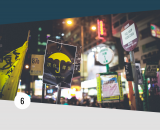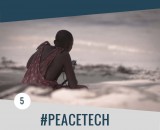Women Peacebuilders Reflect, Connect, and Act
Why is the inclusion of women in decision-making around peace and security issues so important? Here are the cold, hard facts:
• The single best predictor of a state’s level of peacefulness is not wealth, democracy, or identity; it is how well its women are treated.[1]
• Women represent only 4% of signatories of major peace accords in the last 20 years.[2] In that same time period, one-third of all countries that signed peace agreements returned to violence within five years.[3]
• Broadened peace processes, ones that are inclusive and representative of different sectors of society, are 64% less likely to fail than those that include only armed actors and political parties.[4]
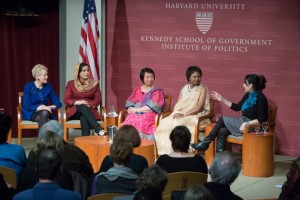
Ambassador Swanee Hunt (left) moderates a discussion with Suraya Pakzad of Afghanistan, Irene Santiago of The Philippines, Amb. Mathilde Mukantabana of Rwanda, and Mariam Jalabi of Syria, at Harvard University, January 14, 2014.
The statistics are compelling, but they don’t tell the full story. The real answer lies in the trailblazers Inclusive Security works with all over the world, who prove daily that women are an astonishingly underutilized, and extremely powerful, force for peace.
Last month, for the 15th year in a row, Inclusive Security convened a small group of women leaders—this year from Afghanistan, Colombia, The Philippines, Rwanda, and Syria—for a week of candid discussions, training sessions, public events, and small-group interactions. No facts or figures compare to hearing first-hand about their motivations, triumphs, and challenges.
“Women make a daily revolution”
Bringing these women together gave them space to reflect on their peacebuilding journeys. What is it that leads them to work every day for a more secure world?
For some, it was a moment where they witnessed firsthand the effects of violence and exclusion, and how women are coping with them. Camila Medina Arbelaez, who documents the testimonies of Colombians affected by the long paramilitary conflict for the Historical Memory Center, grew up in a city where people were indifferent to the privation and insecurity of rural areas. While conducting research in remote villages, she discovered that “violence is not natural; it is a social process. It’s not just a matter of bullets…[it also means] regulating people’s bodies, space, time, relations.” Caught between multiple armed actors, she said, “women make a daily revolution” to protect their children, homes, and land. This revelation inspired her ongoing work for peace and women’s equality in Colombia.
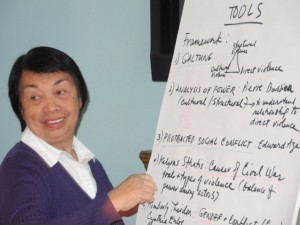
Irene Santiago, CEO of the Mindanao Commission on Women, explains different tools related to conflict analysis.
Irene Santiago of The Philippines, on the other hand, always knew her path. A 2005 nominee for the Nobel Peace Prize, she reflected: “All my life, I’ve wanted to fight injustice and tell the truth.” When a male member of the government panel negotiating with the Moro Islamic Liberation Front (MILF) asked for her to support his efforts, she insisted on a place at the table herself. Good thing, too: After women’s representation in the negotiations increased, so did public perception of it as a legitimate process.[5] Increased legitimacy is one of many powerful impacts women’s inclusion can have.
“Changing the paradigm of the world”
Women leaders, particularly in conservative communities and countries, frequently have multiple forces organized against them. Their work is sometimes solitary, and often dangerous. The solidarity they experience when connecting with women facing similar challenges is invaluable.
Syrian activists, for instance, are currently navigating a treacherous path toward democracy in their country. Hearing from the Rwandan participants, who are marking 20 years since they rebuilt their society in the aftermath of genocide, the Syrian women were humbled and inspired. Honey Al Sayed, a radio host and producer who fled Syria in 2012, asked Rose Kabuye, a former Rwandan freedom fighter, about the apathy of the international community: “Are they going to forget about us like they forgot about you? Are they going to wait until a million people die? What did you do?” In response, Rose offered a valuable lesson and, given the incredible recovery her country has made, a ray of hope: “We did it for ourselves. We didn’t wait for the international community.”
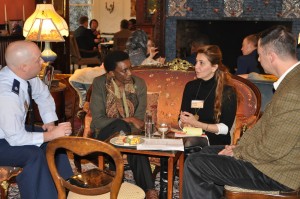
Rose Kabuye, a former Lieutenant Colonel in the Rwandan Army, exchanges lessons with Honey Al Sayed, host and producer at Radio SouriaLi.
The learning extended not just across countries at different stages of conflict and reconstruction, but also between generations, sectors, religions, and other, less tangible, boundaries. The common thread was women’s ability to—as Afra Jalabi of Syria put it—“change the paradigm of the world.” Women are united in the goal of developing a new understanding of what peace and security looks like: not just the absence of war, but dignity and equality for all.
“Power is the potency to act for what is good”
These lessons are not theoretical for the women leaders Inclusive Security works with. Upon returning home, Mariam Jalabi, of the Syrian National Coalition, spent the next two weeks lobbying successfully for women to be added to the opposition’s negotiating team in Geneva. The same week, the female lead negotiator for the government of The Philippines, Miriam Coronel Ferrer, signed a historic accord that ended a 40-year-old insurgency. Afghan women mobilized their collective power to lobby against a new law that will prohibit women from testifying against relatives who abuse them. A group of South Sudanese and Sudanese women coordinated by Inclusive Security delivered recommendations to senior mediators of the crisis in South Sudan, calling for a ceasefire monitoring mechanism, safe passage for humanitarian aid, and a negotiations structure that meaningfully includes women and civil society.
The ever-sage Irene Santiago told us many times throughout the week that “power is the potency to act for what is good.” If that’s true, then these women are the most powerful people I know.
Dr. Valerie M. Hudson (below) will be featured in Issue 3 of Building Peace.
[1] Hudson, V.; Ballif-Spanvill, B.; Caprioli, M.; & Emmett, C. (2012) Sex and World Peace. (NY: Columbia University Press), 205. [2] UN Women (October 2012). Women’s Participation in Peace Negotiations: Connections between Presence and Influence. (NY: UN Women), 3. [3] Uppsala Conflict Data Program (December 2012). “UCDP Peace Agreement Dataset v.2.0, 1975-2011.” [http://www.pcr.uu.se/research/ucdp/datasets/ucdp_peace_agreement_dataset/] [4] Nilsson. D. (2012). “Anchoring the Peace: Civil Society Actors in Peace Accords and Durable Peace.” International Interactions: Empirical and Theoretical Research in International Relations, 38(2), 243-266. [5] DeLangis, T., Across Conflict Lines: Women Mediating for Peace; 12th Annual Colloquium Findings, (Washington, DC: The Institute for Inclusive Security, 2010).
